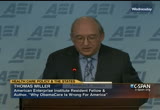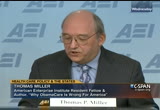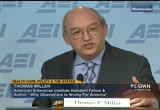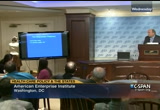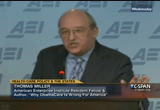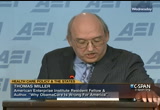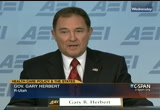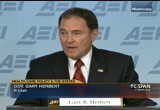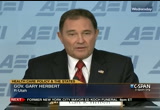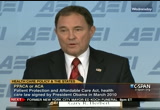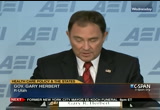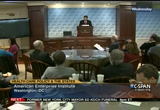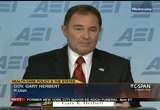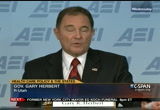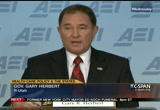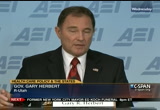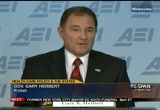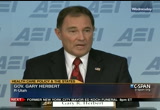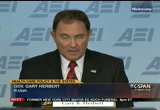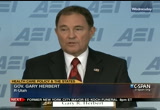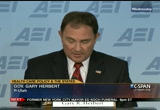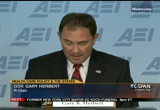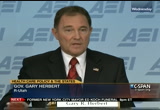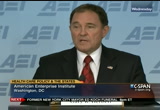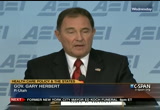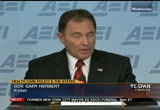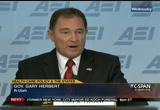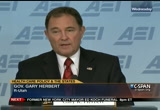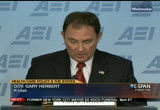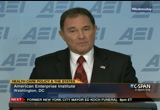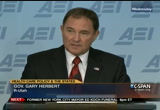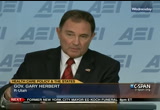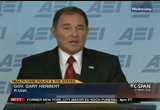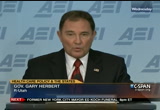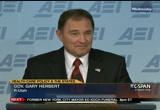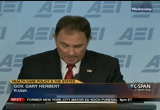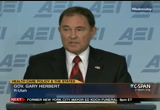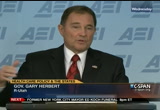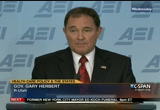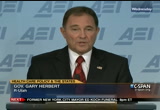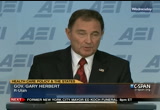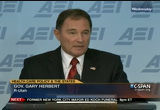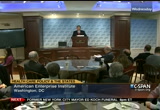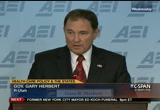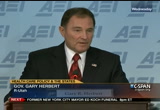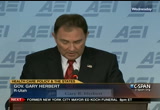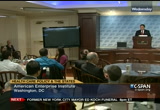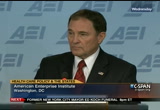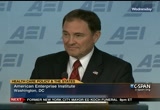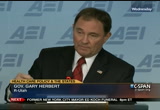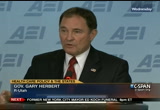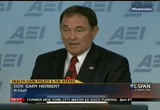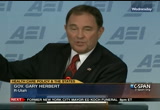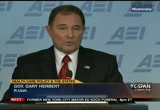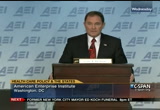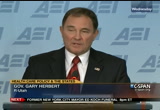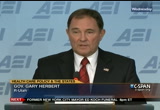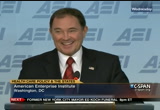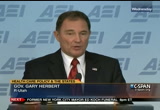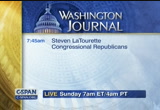tv Gov. Gary Herbert R- Utah CSPAN February 9, 2013 7:00pm-8:00pm EST
7:00 pm
quality choice or an echo? we have governor gary herbert how to speak today from the state of utah. utah pioneered its own health exchange. even before the affordable care act was passed or was being drafted. they have continued on without with some success. there is been a back and forth to between utah and the department of health and human services and the obama administration as to what does or does not comply with the dictates of the affordable care act. the only state in a quandary as having something on the ground. surely the governor will talk about the utah exchange and places in the larger context of what should represent innovative and effective state led health
7:01 pm
policy reform. he will also talk about utah's approach to medicaid reform. and the overall youth leadership -- the overall. overall last month in obama administration decided if you cannot change the product, you can change the name. they decided in mid january it will no longer be called help exchanges but health marketplaces. the official explanation for this was it was because the word exchange cannot be translated into the spanish language and for the millions of hispanic beneficiaries currently under the exchange, they would not know what it meant. i want to be helpful in this
7:02 pm
regard so weakened at least provide some additional terms for the beginning of the obamacare dictionary. -- regard so we can at least provide some additional terms for the beginning of the obamacare dictionary. donation -- that as a new term. another term, mandate, has spent translated to suggestion. we have a couple other terms in the law -- community rating. sounds exotic but it can be translated into the yahya pay more. partnership -- translated into the young pay more. partnership, translation, you
7:03 pm
take the blame. medicare savings, and very complicated. spanish term -- double counting. i look for other terms in the affordable care act. premium reductions -- the sky is the limit. these are some of the terms we could not on the translation not only in the affordable care act or spanish dictionary but not even in a plain english dictionary. market crisis, and nowhere to be found. another hard one, compulsory choice. another question is what are the chances of successful implementations? that translates as, when pigs fly.
7:04 pm
the, at a crucial moment and did the whole policy deciding how the implementation will occur -- we come at a crucial moment in the whole policy deciding how the implementation will occur. so that is where we are at the moment. let me speak to governor herbert who is a good sport about this. he is key cost 70 governor of utah -- he is the 17th governor of utah. he is on the executive committee of the national governors' association. before becoming could keep executive of the state, he served as lieutenant governor for 05 years.
7:05 pm
yet and in washington this week have been wonderful conversations regarding the feature of this date -- of his state's marketplace. the utah exchange is half full. we will see based upon early readings what that might mean for its future. today's presentation is brought to you by the to"h." governor gary herbert -- to this presentation is brought to you by the letter "h." governor gary herbert. >> thank you for the and deduction. i am honored to be here with the american enterprise institute -- thank you for that introduction. i am honored to be here with the american enterprise institute.
7:06 pm
they have helped the development of policy. thanks to you and for the invitation to speak. we will talk about health care today and maybe from a utah perspective and in my view of the world when it comes to health care. it is a complicated topic. i know health care has been on the lips of many. watercolor topic that it may be. -- watercolor subject that it may be. there was a conversation of -- about who is the easiest person to operate on. one doctor said the easiest people are mathematicians. when you open them up, all their parts are numbered. very easy to reassemble.
7:07 pm
an easier category is librarians. you take them apart and there alphabetized. only 26 letters. the third doctor said i know it better categoric operate on -- mechanics. they understand if you do not get finished on time and their exports, that does not cause the much concern either. the last doctor says i can say by far the easiest people to talk -- to operate on our politicians. you open them up and find out the have no heart, no spine, no guts and their head in their rear end are interchangeable. [laughter] i think that defines some of the challenges we face as we develop
7:08 pm
policy year. -- we develop policy here. the mixtec by telling the story of a small business in my hometown -- let me start by telling the story of a small business in my home town called world class auto. there are 10 employees. as has happened to many since the passage of the affordable care act, premiums have gone up. if he was unable to continue to pay for that benefit package to his employees. the concern was what to do. he came across in the utah health exchange and found out he was able to define how much he would pay as a business person.
7:09 pm
he also found he was able to have his 10 employees shop through the portal to find an individualized, customized plan suited for them. not one size fits all but one they can shop. and in doing so, he introduced this process -- this process introduce competition said they could have people buy for their dollars -- people vye for their dollars. he is able to provide affordable options for his employees and still provide them with the benefit package that includes health care reform. it was clearly a win win approach. that is the example of what we have provided in utah and the
7:10 pm
health care james. -- and the health care exchange. i am not sure we have to find the debate very well as we set this up in the beginning of the term. i say that meaning that i expect if we talked about what health care reform means to each of us here, we might find different answers. somewhat think health care reform has to do with access. some might think it has to be focused on better quality. some would say health care should be focused on the cost or the rising cost. there is no question the health care has been rising in many
7:11 pm
different ways and the costs are being put upon us for a variety of reasons. we got involved because like many of around the country, the rising cost of the health care was making it tough for businesses and government to pay the benefit costs. we found out by a survey that 7% of those in utah who did not have insurance blamed it on the rising cost of premiums. they cannot afford it. we wanted to find out what we could do to contain the costs. what are the principles we will follow? i believe it and the free- market. no matter what the issue is, we found if you want to have the most benefit, the best quality of goods and service for the most people at the lowest cost,
7:12 pm
that happens in a free market situation. and i don't know exactly why it is we think somehow an exception to that rule will be health care. in utah, we believe that should be part of it. we want to give consumers a choice. free market competition to have the marketplace to find innovation and solutions to the problems the marketplace defiance. that is what we have tried to do with our health care exchange in utah. the -- the concern for many of us, there are so many people that did not have access to health care. in our state, we have around 13% that did not have it. that has ramifications on the
7:13 pm
marketplace. if you do not have health care, you probably delay treatment, preventive issues and the cost eventually is even more expensive. too many people go to the emergency room as their initial introduction to some kind of health care. that is usually charitable care and the cost of that gets passed on to the rest of us. i think the affordable care act does not address rising costs. all it does is address who will pay the rising cost six. it is an short-sighted in adjusting less -- short-sighted in addressing this.
7:14 pm
we should focus on what we can do to reduce the costs from tehe provider. our premiums were rising in utah had a dramatic rate, 7 times what they had been in the past 8 years. we wanted to put the customer back in charge. in 1960, the consumer spent a about 60% of their own money on health care. -- the consumer spend about 70% of their own money on health care. today that is flipped.
7:15 pm
they may pay up to 30%, but 70% is paid by someone else. when people are not spending their own money, they are less conscientious of how to spend it. they are not as discriminating. it, i willaying for get more steak and probably less hamburger. our system has a disconnect. because of that, more businesses are dropping as a benefit health care coverage and fewer are covered. in utah, have about 45% of businesses that are providing health care as a benefit to their employees. what to do and how to do it?
7:16 pm
the philosophy we have goes back to free-market principles. we believe in the marketplace finding solutions rather than the heavy hand of government. tell me what to do and how to do it. we want to have a process that is consumer driven. that provides greater choice, better access and have the consumer in charge of the dollars. sometimes we forget this is about people and their health care. utah has done -- has done a good job providing healthy, quality lifestyle. we have been rated as one of the healthiest states in america. we have in place with our system the lowest cost health
7:17 pm
care in america. and we are the fifth or sixth highest quality of life. we will be forced to fix a problem that is minimal in utah compared to other parts of the country. we think that is the wrong thing. the uniqueness of each state should be accounted for. we have put together clearly defined principles and goals of what we are trying to do. along with our free market principles and containing costs and consumer choice, there should be a compassionate part of this. and ensure there is a safety net for those who really need some help. i think as george w. bush said, i am a compassionate
7:18 pm
conservative. what i do not always believe -- [indiscernible] charitable care, civic organizations, neighbor to neighbor, our faith based organizations -- all opportunities to help provide safety net issues. government has a role in that but it should be limited. we should exhibit compassion and understanding and understanding are dealing with people and we want to have appropriate outcomes for them. we formed the health care exchange, we had some key components we thought would contribute to the success. some of the uniqueness of our health care change has been mentioned. we have a defined contribution. most have defined benefits. you can actually fix the amount
7:19 pm
of money you will give kent you know with certainty what the future will bring us far as their costs if you are an employer. we have also removed by legislation the insurance coverage mandates. we have said insurance companies are free to provide whatever options they want and consumers are free to choose. that is something we want the marketplace to embrace and have the freedom to provide whatever product it wants, which certainly increases and allows for more choice for the consumer. we also wanted to have a quarrel where people can go and find -- to have a porthole -- to have a for people can go and
7:20 pm
find information. competing for consumer dollars keeps better products, market at lower cost. it is something that should not be lost in this effort to provide better health care. last butnot least, the use of technology. we have the ability to share information with technology that we have today, having databases where we can it street -- where we can share information and keep the cost down and make sure the consumer has good information so they can make the choice. this empowers the consumer. at the end of the day, i trust the consumer to make decisions
7:21 pm
in the best interests of them. we have to much of a government mentality that things we know best, we need to choose for you because you may make the wrong decision. i think that is wrong- headed. utah is a way of addressing this reform. it may not be the way. other states have different demographics. we have a young population in utah. i am the oldest guy in utah. [laughter] but if you compare our demographics with florida which has a lot more seniors, their health care needs would be different from the health care needs of utah. there should be some reflection in that. i do believe the focus we have
7:22 pm
7:23 pm
with this rise in premium costs with their insurance company. i had a 22% jump. -- they had a 22% jump. that was is a difficult problem for their budget. they look into the utah health exchange and found they had some options there and went to their employees and said we do not want to pay this 22% increase. we will pay something less and give you the difference of what we paid last year. how much we put into premiums we will give to you to spend plus a cash bonus. then introduce the exchange and with that competition, they now had individualize insurance programs they could pick from. about 135 different programs were available through the portal. it proved to be the win win for
7:24 pm
the business and the consumer. and keeping costs from escalating from where a company would be forced to drop. probably nobody knows more about health care that our former governor, mike levitt. he was raised in an insurance family. his father was a very successful businessman in insurance. his experience gives him and perspective and his imprison of our exchange tells us we are on the right track. we are in our infancy. the utah health care exchange is not as robust as i think it is capable of being. part of that is because of the uncertainty in the marketplace. people are a little bit hesitant to take action.
7:25 pm
the uncertainty comes in two areas -- what is happenign in washinghton, d.c., causes concern about the marketplace but the uncertainty of the affordable care act. we have been dealing with this for 2 1/2 years asking questions, not getting the find answers, finding the answers cannot be given because they do not know the answers. it creates a lot of confusion. now with what has taken place, we have answers. we know the affordable care act is here to stay. we did not like the affordable care act and we challenged it in court.
7:26 pm
we thought the supreme court would come down on our side. we hope the election will turn out a bit differently. mitt romney was our champion and we knew he would have some efforts to repeal obamacare and the affordable care act but we now are to the poionnt where the affordable care act is the law of the land in utah is prepared to participate in that effort. we believe our exchange has a role to play and in the current situation. the contributions our employers make into the defined contribution vary from zero --
7:27 pm
to $2,000 a month. the average is $437. it has the potential to grow dramatically. about a third of the people who join our exchange are companies that previously did not provide insurance to their employees. the are finding a way they can afford it and it fits in with their business model provides a benefit package. let me take some time for questions in a few minutes. i think we have a hard time talking about health care reform without addressing the affordable care act. i do this knowing it is the law
7:28 pm
of the land and i do not want to sound too pejorative. it is something i did not support but i think the process was flawed. if we look at how we got to where we are today, the process was flawed. if you have a flawed process, you have a harder time getting a good outcome. in this process, nobody ever came and said to the governors and the states, what do you think about the affordable care act? you are going to be the most dramatically improved government entity in the country, what are your suggestions, what are your criticisms, what are your insights? that was a big, big mistake, not inviting the governors to the table. and i think we could have given them some insight and some
7:29 pm
suggestions to make it better if they had done that. secondly, i think that the fact that we dropped 2,700 pages on the congress and said we're going to vote on this in three days, you know, it's just not the right way to process statute, particularly as complicated as those 2,700 pages are. we will go down in legislative history, probably not for good, was speaker pelosi saying we have to pass this bill to find out what's in it. that's just not good process. and it has spawned hundreds of thousands of pages of regulation, which is still being sought to find out, what does this really mean and how is it going to be applied to the states. and we have a boon dog will of a problem that is going to be a challenge for us. at the end of the day for us in utah and other states that are struggling, how has our approach
7:30 pm
to health care reform and operate in an a.c.a. world, how do we fit in with the law of the land? our exchange, we have named it avenue h and it's not for avenue herbert, but the difference between the federal exchange -- we talk about the exchanges that have taken on a negative connotation. an ability to facilitate people's choices is a good idea. our exchanges are those different from those envisioned by the a.c.a. we focus on small business, working through them to provide access to their employees on an individual business, but through the business community and get people enrolled in private insurance.
7:31 pm
our exchange, interestingly enough, only has five employees. the total costs for what we do on an annual basis is $600,000 a year. we aren't spending a lot of money on this process. so we have the ability to expand. but we have an administrative process, which means we let the market make the decisions. we facilitate opportunities and that's all that we do. by contrast, the a.c.a. exchange is based more on the massachusetts model. they focus on large businesses and individuals. they have a mandate that they're dealing with. and they provide taxpayer subsidy for 98% of all the people that participate in their exchange. they have dozens of employees. i mean, the size is massive.
7:32 pm
and they spend tens of millions of dollars to operate it. so the contrast is pretty stark, as you can see. they also have an active administrator approach where they pick and say, this will be acceptable and this will not. they just don't let a free- market approach. they identify and pick who gets to be in the exchange. i do believe this, that effective health care reform cannot be a one size fits all. states are unique. i mentioned the difference between utah and florida. the uniqueness is exhibited in each state and each region. each state ought to have the ability to reflect their own unique and specific needs. again, the one size fits all mentality comes out of washington, d.c., putting us on a wrong road. now, our proposal we're making -- and i will tell you, this has been a work in progress, some of it is out in the
7:33 pm
marketplace but some of it's not. we are going to amplify of what we are trying to do under the confines of the affordable care act and the law of the land. and we are committed to work within those confines. like it or not, it is the law. there are what we call red lines we will not cross over as a state. if our exchange, we have a right to run it as we see fit. we aren't taking federal money. there are no strings. it's our exchange. and so we are saying the things we won't do. we won't enforce the individual mandates, even though the supreme court has ruled that it is constitutional. we still think it's bad policy. for a number of reasons. we aren't going to enforce the individual mandates. and now every state should have the option to determine for themselves if a mandate makes sense, but this state, utah, has decided it's not the right
7:34 pm
thing. and frankly, i don't want to be on the receiving end of phone calls where individuals are saying, the i.r.s. is calling me and wanting my number because i haven't signed up for the insurance program. second, we will not administer medicaid through utah's health exchange. we want to maintain a clear separation between an approach in the private sector and providing opportunities in the private sector as oppose todd a welfare-based system. not that they're not an important aspect of it, but we think there should be a clear separation between those two approaches. we want our exchange to remain focused on the core mission of creating competition and choice in the insurance marketplace. those who are in need, again, we recognize people out there that have the access, right and need and medicaid may be the
7:35 pm
answer but it should not be done through our exchange. third, utah will not administer the premium tax credit through our exchange. there's a number of reasons we decided why not to do that. one, we pride ourselves in utah in being fiscally prudent. and i wish washington had that same pride which they certainly don't have in being fiscally prudent. only seven states in america have a a.a.a. bond rating on wall street, which tells us a lot about utah and what else is going on in the country. given the fiscal uncertainty we see here in washington, d.c.,, much of it created by a growing mentality, doesn't seem to me and to the people of utah to be a fiscally prudent thing to do when we are already borrowing 40 cents on every dollar that we spend and in large part because of the growing entitlement mentality we have in the country.
7:36 pm
i think this becomes a very risky proposition as we go forward. i don't know how much it's going to end up it's going to cost and i don't know anybody knows how much it's going to cost us. i do know the original promise by the president was going to cost us $900 billion. today the c.b.o. estimates it has gone from $900 billion to $2.7 trillion today. it's tripled three times. and we're just starting. i mean who knows where it's going to go.
7:37 pm
if we look at the social security, we look at medicare and look at medicaid, history says, these are going to explode and become a lot more costly as we go forward. i shudder to think what the fiscal ramifications are going to be of this going forward. so last, again, i'm concerned about the insurance costs are going to skyrocket as part of this. the promise again given to us, the hope was that premiums were going to go down. the numbers are like $2,500 and what we have found is the premiums have gone up $2,500. that is a $5,000 swing from the concepts proposed and the reality of today. we are a state that is young and healthy. estimates are that our cost of premiums in utah under the affordable care act will go up between 65% to 100% on the high, because those who are young and healthy will have to be part of the pool and will have to have a higher burden to take care of others that are going to be brought into the overall pool.
7:38 pm
that price shock we will face in utah again, is a concern for all of us. and i think it could be a problem. in that effort to manage those risks and to live by the law, i have done things to manage that. and at least see if we can't give another option out there for the people in utah that exists. to that end, i sent a letter to president obama and asked him to take a look at our exchange and certify it as compliant under the a.c.a. and i sent a letter to secretary sebelius saying we have a good-faith effort and we started before this became a discussion topic here in washington within we would like to continue to maintain our state exchange. yesterday, i had the opportunity to meet with secretary sebelius and let her know that utah's exchange is going to continue and we will
7:39 pm
continue to be doing what we ought to be doing and i suggested to her that we bifurcate the responsibilities under the affordable care act. utah will continue to operate as small business exchange and retain oversight of the insurance markets within utah. two, we will retain control of our medicaid eligibility system and make the final determinations as far as who is eligible for medicaid, including chip and using our existing system to do that. we respectfully say to the u.s. department of health and human services that if they assume the responsibility for the individual exchange and that includes the web site portalforindividuals, including the tax credits.
7:40 pm
further, we would say that because utah is doing the business portion of the business, that there's no need to have a federal exchange doing the business. so we have a clear line of demark occasion. we are going to do the business and the federal government will do the individual side of this and see if we cannot, in fact, co-exist peacefully here and provide that to the marketplace. there are details yet to be worked out and putting this together and making sure that we are doing this in an appropriate way. but i was gratified and encouraged, when i met with secretary see bell yuss -- sebelius today, that they will look at it and see if there is something we can agree upon. the phrase she used was, i would like to find a way to get to yes.
7:41 pm
so i'm cautiously optimistic and have a ways to go and will be meeting with them in the next couple of weeks to bring closure to this issue. now, last, but not least, let me just say this, and i would expect that all governors and all states could say this with me, one, i'm committed to health care reform. i think it's something that needs to be addressed. it ought not to be republican versus democrat, liberal versus conservative. we ought to all appreciate that we need to do and can do things better in the health care arena to, in fact, improve health care outcomes for our people. i'm a free-market guy. i'm in the category of economists and believe in the free-market system. we, in fact, are doing in utah on an annual basis a health care summit where we bring together nurses, doctors and
7:42 pm
practitioners, insurance companies, lawyers, business people from all stripes and saying, what can we do to improve health care outcomes in utah and reduce costs. that discussion is healthy at least in the exercise we are going through to help directly affect costs. we are looking to expand our exchange to provide opportunities for all of our state employees to be part of the health care exchange of 22,000 people and their families that will be able to put on. we would like to expand the exchange to not only to small businesses, which is up to 50, and then go to 100 and larger. the defined contribution model ought to be available to all employees, all employers, regardless of their size. there are issues that we will be tackling and talking about. medicaid comes to the top of my mind. medicaid, i think most governors will tell you is the budget
7:43 pm
buster of all. it is dramatic challenges. what originally started out a decade ago, 9% of my budget is up to 20% and the next decade is 30% of our budget. it takes away from education, infrastructure, other health and human service needs. so medicaid and the need to have flexibility is something we are go to go watch as we go forward. let me finish where i started. we need to address the rising costs of health care. i don't think the affordable care act does that. we have provided an opportunity with our health care exchange in utah is a model based on good principles that allows businesses to provide as a benefit and health with competitive forces and consumer control to, in fact, have an impact on the rising costs of health care.
7:44 pm
it may be imperfect, but it's a step in the right direction. again, the fundamental position i'm taking and we're taking in utah is that the free market works if you allow it. and takes politicians like myself and others to be disciplined and to give time for the marketplace to work. we sometimes are so anxious to fix the problem, that we don't let the marketplace make the adjustments necessary to get the right outcome. and again as i said, if we want the best quality product, the best benefit we can possibly have for the most people at the lowest cost, that happens in a free market. and it happens from the beginning of this country's history. it has happened for all goods and services we have had and health care should be no exception. with that, i thank you for allowing me to come and talk and thanks for the invitation to tell about the utah health care exchange and people can learn
7:45 pm
from what we're doing in utah. thank you. [applause] >> thank you, governor herbert. we'll take questions today. down in front. >> governor, thank you for taking my question. the catholic bishops have declared that the obamacare mandate on contraceptions, sterilization and abortion- inducing drugs is unjust and illegal and a violation of religious liberty that they will not obey.
7:46 pm
do you agree with the bishops that the mandate is a violation of liberty under the first amendment and if so, will you also not comply with it? >> i do agree with the bishops. it is inherent in the signing of our liberty and utah has its own history of persecution and people trying to deny their religious liberty, it is something we are concerned about in utah and people ought not to use taxpayers' money in to something that is repugnant thing to do so we support the position of the bishop. >> very quickly. i want to thank you for the leadership you have shown. it takes incredible political courage to do what you are doing and to step back. you are good at bringing down the family perspective of what reform means at the state and federal level. there are states watching everything you do and that's a
7:47 pm
good thing and also a lot of pressure. h.h.s. has a big incentive to spin their conversations with you and make it look like what your exchange will be in the future is truly a partnership with the federal government. many people see what you're doing, not as a partnership, but as a governor who is protecting his people and leading his state forward and allowing h.h.s. forward to allow what it needs to do. and another question very much related on the question of medicaid, states that haven't made up their mind are watching your every move, no pressure. and so the questions that they are raising with medicaid extension, you have the state of utah that is known to be one of the best-run states in the country and you have turned down federal funding.
7:48 pm
governors are hearing and legislatures are hearing that it is fiscally irresponsible to turn down federal funding. so it's likely to be a partnership for you as well. if you could talk a little bit about the two issues, how you're protecting utah's needs in exchanges, but also how you see the principles playing out. >> well, first let me say, there are always people who criticize what we do and you can't please everybody and it's important for us to develop a set of principles and goals. we did that in the beginning, principles, goals and objectives and let's not get caught up in the emotion of the moment. health care is an emotional thing and when your loved one is having struggles and looking for help, it's easy to say, where's the government to help us? we need to stay to true principles, that will give us
7:49 pm
the right outcomes. this needs to be looked at under the umbrellas of budget. i mentioned the function the other day, they were talking about costs and why are we not, in fact, embracing this expansion and this money, you know. and i said, you know when i was a young man, i bought my first car and had a couple of different choices out there. and my dad said you can buy it if you can afford it. i think that's part of the challenge of medicaid expansion, you can buy it if you afford it. i reject the idea that somehow it's free money. it comes out of the same pocket whether you labeling it state tax money or federal tax money, it comes out of the same pocket. there ought to be a concern where we are borrowing 40 cents on every dollar that we are bringing this country on the verge of bankruptcy.
7:50 pm
can we make some adjustments and is it irreversible? states have a responsibility, too. we can't keep going there with our hand out. it is hard for us to say, if we don't take it, that money will be distributed to somebody else. you will get the benefits, but we still have to pay it back, my kids and grandkids will be on the hook for that growing expense. there is always that temptation. we talked earlier, elections have consequences. we have to put people in place in washington that understand that this spend more, borrow more has got to stop. we have to come up with some kind of fiscal restraint here in washington. states can help. i have gone and testified before a couple of congressional hearings, i think other states will join with us, we'll take less money.
7:51 pm
why don't you just say to us, we'll take 20% less money in utah. take away the strings. unfetter me. i will find innovative ways to do things. we don't have to have a diminishment of services. we can do more with less. government is labor-intensive. in utah today, we have fewer state employees today in 2013 than we had back in 2001, a dozen years ago and yet we have 600,000 to 700,000 more people. we are a fast-growing services. we are doing more with less. now in washington, we are doing less with more. it's just the reverse of that. we have to change that mentality and states can help lead that way. >> one-part question.
7:52 pm
>> thank you, governor. >> question, based on what you're seeing, how do you feel the federal government is doing getting your own exchange ready? they may not meet some of the deadlines, do you think congress should push back the deadlines to get ready? >> it's hard for me to look into the apparatus of the federal government and see how they're doing. i guess i'm a little john dissed-eyed. but i think they are surprised about the lack of embracement by states or the exchange. most are defaulting to the federal government and i'm not sure that is a good thing overall for states' rights and those who don't want us to go to a single-pair system, might be encouraged to have that happen quicker.
7:53 pm
they have tower hire hundreds of thousands of people and to set that up and understand how they are supposed to do it, again, when you got 200,000 pages of regulation that we're still trying to figure out what does it mean, causes a lot of confusion and uncertainty and i think it's going to be forced to have to delay the actual implementation of all of it. and i guess we'll remain to be seen and don't want to be too critical. this is the most humungous change in our society since social security and f.d.r. >> question at the table. >> thank you, governor. competition in the free market for the utah health exchange. given that if somebody is making $35,000 a year, their penalty is $60 a month.
7:54 pm
a.c.a. is projected to cost $400 a month. can you lobby h.h.s. to level the playing field. because how are you going to compete and it's costing $400? if that would do it if somebody had an interest. and what is your opinion on competition for leveling the playing field in the penalty situation? >> people have to qualify to receive the tax subsidy. so there are parameters in place. when you are willing to -- you can have 400% of poverty. people making over $100,000 and qualifying for tax subsidies.
7:55 pm
that does make me pause and say is this the road we want to go down. is this where government ought to be when it comes to health care reform? our business side does not have the subsidy. it's for people who don't qualify for the subsidy. and if they want to go to the individual mandate and i think there's going to be pressure where people find out, hey, if i go across the street to the federal exchange, i can get some subsidy and that probably is going to have some impact on the marketplace. our business people, we know what they do, but we are trying to introduce into the private sector marketplace and have them choose. whether they qualify for subsidy or not. \[inaudible question] >> then they could have choice? >> we could dangle the carrot out there which is money and we could probably change the incentive. we are reluctant to do that, though, because we think this incentive program is the wrong way to go.
7:56 pm
why do we subsidize and think we aren't going to get more of it? if you buy, you are going to get more, because people like what you are buying. our entire welfare program has grown because we are subsidizing probably incorrect behavior. i'm very concerned and everything i look at is going to cost under the umbrellas of the budget and i'm a proud american and i'm concerned where the direction the country is going and i see no end in sight. we are $16.4 trillion in debt. >> thank you. >> we have time for just one more, very short question. we are market oriented here. i sigh only one bidder here. i think we'll go down here and this will wrap it up.
7:57 pm
>> good afternoon, governor. just a quick question about navigators and personal assistance. will utah be hiring these navigateors and in-person assistants? and if so, how will you balance it with the professional insurance brokers, which i know the brokers are paid commission to work with employers and with individuals to help them navigate the market and how will utah being doing that, if they are? >> we are going to be passive. we aren't going to try to navigate anybody other than introduce them to the portal. they can shop. they are smart people. the different companies are part of the insurance exchange and they will give them information. they can shop and compare. you can look onto the portal and see the program is, 135 different choices, pick one that suits you.
7:58 pm
see what the cost is. talk to an insurance broker and see what advice he wants to give you, but we're passive. we want the consumer to make those decisions. informed choice with a lot of selection, introducing compression from the different vendors saying we want your money and we'll do this for you, which will help keep the costs from rising. >> governor herbert, it's our honor and pleasure to have you here today. please thank him for his remarks and his principaled leadership. [applause] [captions copyright national cable satellite corp. 2013] \[captioning performed by national captioning institute] >> tomorrow on washington journal, and talk about moderate republicans and to go congress and the rules that play in fiscal issues on capitol hill. the senate will vote monday on the renewal of the violence against women act. we will talk about gatt -- about the act.
7:59 pm
and the look and north korea's missile capability. washington journal, live at 7:00 a.m. eastern on c-span. >>mary todd lincoln. >> three of her four children died. one in the white house, one shortly after her husband's assassination. the kind of grief this woman went through, amazing. folks demonized her, thought she was crazy. we found out she was not crazy. mary todd was a very significant person and i hope some day we get a better view of the range of things that into a term life, not just the tragedy. >> first ladies, a first of its kind product for
88 Views
IN COLLECTIONS
CSPAN Television Archive
Television Archive  Television Archive News Search Service
Television Archive News Search Service 
Uploaded by TV Archive on

 Live Music Archive
Live Music Archive Librivox Free Audio
Librivox Free Audio Metropolitan Museum
Metropolitan Museum Cleveland Museum of Art
Cleveland Museum of Art Internet Arcade
Internet Arcade Console Living Room
Console Living Room Books to Borrow
Books to Borrow Open Library
Open Library TV News
TV News Understanding 9/11
Understanding 9/11